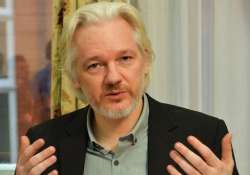Wikileaks founder Assange detained arbitrarily, should be freed: UN panel
Geneva: A human rights panel of the United Nations has said that Wikileaks founder Julian Assange has been “arbitrarily detained” by U.K. and Sweden since December 2010 and he should be freed and compensated.The U.N.

Geneva: A human rights panel of the United Nations has said that Wikileaks founder Julian Assange has been “arbitrarily detained” by U.K. and Sweden since December 2010 and he should be freed and compensated.
The U.N. Working Group on Arbitrary Detention, which falls under the offices of the U.N. human rights chief, made the call in an 18-page document made public on Friday after it had notified Assange.
"The Working Group on Arbitrary Detention considers that the various forms of deprivation of liberty to which Julian Assange has been subjected constitute a form of arbitrary detention," said panel chairman Seong-Phil Hong in a statement.
Swedish prosecutors want to question Assange over allegations of rape stemming from a working visit he made to the country in 2010 when WikiLeaks was attracting international attention for its secret-spilling.
Assange has consistently denied the allegations but declined to return to Sweden to meet with prosecutors and eventually sought refuge in the Ecuadorean embassy in London, where he has lived since June 2012.
In an indirect swipe at Sweden's judicial system, the panel noted that Assange was never formally charged in Sweden — only placed under preliminary investigation.
Citing the International Covenant on Civil and Political Rights that has 168 state parties including both Sweden and Britain, the panel said "the adequate remedy would be to ensure the right of free movement of Mr. Assange and accord him an enforceable right to compensation."
The panel's decisions are not binding on states, even if they are generally considered a good arbiter of international law. Both countries rejected the findings in the Assange case.
"The statement from the Working Group has no formal impact on the ongoing investigation, according to Swedish law," said Karin Rosander, spokeswoman for the Swedish Prosecution Authority. She said the prosecutor in charge of the case was travelling and not immediately available for comment on the decision.
The panel criticized a "disproportionate" reaction by Swedish prosecutors in issuing a European arrest warrant rather than seeking to question Assange using bilateral agreements with Britain, and insisted that the Swedish prosecutor "refused" to consider other ways of interviewing him compatible with his right to asylum — which it said was not properly respected.
Britain's Foreign Office said in a statement it would formally contest the panel's opinion.
"This changes nothing. We completely reject any claim that Julian Assange is a victim of arbitrary detention," the Foreign Office said in a statement. "Julian Assange has never been arbitrarily detained by the U.K. The opinion of the U.N. Working Group ignores the facts and the well-recognized protections of the British legal system."
It countered that Assange was "voluntarily avoiding lawful arrest by choosing to remain in the Ecuadorean embassy."
The case has also been complicated by uncertainty surrounding Assange's legal status in the United States. The U.S. government has not revealed whether he has been indicted — grand jury proceedings are secret there — but has indicated that sensitive investigations into Assange and WikiLeaks have been made.
The working group said Assange could face "refoulement" to the United States — being handed over to a country where he could face violence or prison. The U.N. upholds the principle of non-refoulement prohibiting that practice.
(With AP inputs)